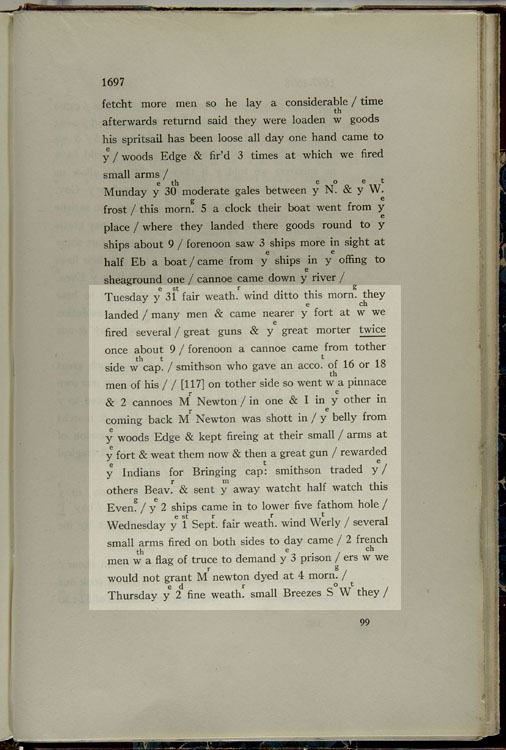
|
|
| Author: |
Henry Kelsey |
| Title: |
The Kelsey Papers |
| Publisher: |
Public Archives of Canada and the Public Record Office of Northern Ireland |
| Year Published: |
1929 |
| Copyright Holder: |
Expired; no restrictions on use. |
|
|
|
Henry Kelsey was apprenticed to the HBC in 1684 and served the Company on land and at sea for most of the next 38 years, eventually becoming the HBC's overseas Governor. This excerpt is from a journal titled "A Journal of wintering by gods assistance/at Hayes river in ye year one Thousand/six hundred Ninety Six Septr ye 18th," in which Kelsey described recapturing York Fort from the French in 1696 and losing it again the following year.
It was a very difficult time for the HBC, as they suffered from repeated attacks by the French, usually led by commander Pierre le Moyne d'Iberville. After the defeat of 1697, the HBC only controlled one fort (Albany) until 1714, when (according to a peace treaty signed the previous year) the French handed York over to HBC Governor James Knight and Deputy Governor Henry Kelsey.
In the last entry of 1697, Kelsey describes the surrender of York Factory on Sept 2nd, 1697, p99-100, 3rd pgh:"Tuesday ye 31st...Henry Kelsey."
"Tuesday the 31st. Fair weather. Wind ditto this morning. They landed many men and came nearer the fort at which we fired several great guns and the great mortar twice.
Once about 9 forenoon a canoe came from the other side with Captain Smithson who gave an account of 16 or 18 men of his. On the other side so went, with a pinnace and two canoes, Mr. Newton in one and I in the other. In coming back, Mr. Newton was shot in the belly from the woods edge and kept firing at their small arms at the fort and we at them now and then a great gun.
Rewarded the Indians for bringing Captain Smithson. Traded the others beaver and sent them away. Watched half-watch this evening. The two ships came in to lower five fathom hole.
Wednesday the 1st September. Fair weather. Wind westerly. Several small arms fired on both sides. Today came two French men with a flag of truce to demand the three prisoners which we would not grant. Mr. Newton died at 4 this morning.
Thursday the 2nd. Fine weather. Small breezes southwest. They began to play their mortar hove four shells then came with a flag of truce to demand the fort. Being denied, went their way and fired again till they had hove fifteen and we fourteen, then came again telling us we should have no quarters. We told them if they would not allow us time to consider we would have none, so the Governor drew up a paper and brought on the platform to satisfy the men they should have everyone a years’ pay gratis if they would sign the paper and we kept the fort.
Some did sign, others not and said would not sell their lives for a little money. So sent our articles and in the evening I, Mr. Bishop, Mr. Clark went to their camp to hear their final answer. So d'Iberville wrote his resolution, demanded the fort by one o’clock the next day and our answer by 8 in the morning.
Friday the 3rd. Fair weather. Wind ditto. Finding such great force as nine hundred men and the ill tidings of our own ships, concluded could not keep it and so agreed to the articles aforesigned by Monsieur and the Governor and marched out by one o’clock and the French took possession of the fort, this being the end of a tedious winter and tragical journal by me, Henry Kelsey."
Did
You Know?
What does Kelsey mean when he writes that the French told them they "should have no quarters"? If the English did not surrender, the French would kill them.
|
|